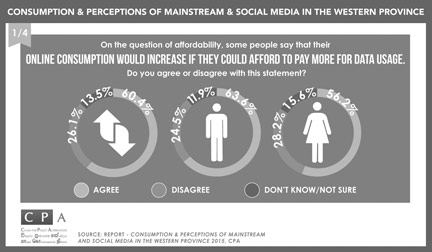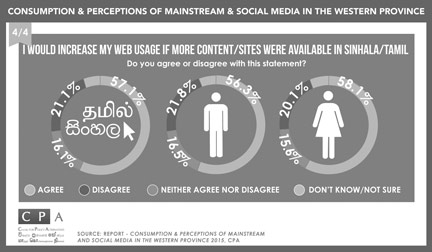Media
trends in numbers
 * When asked if they enjoy keeping up with the latest news and
current affairs, only 1.7% of respondents said 'not at all'. 55.1% said
that they enjoy it a lot while 42.3% say they enjoy keeping up with
some. * When asked if they enjoy keeping up with the latest news and
current affairs, only 1.7% of respondents said 'not at all'. 55.1% said
that they enjoy it a lot while 42.3% say they enjoy keeping up with
some.
* Private television is the most popular source of news for the
respondents, followed by Facebook and the Internet/web. When breaking
down the findings by age category, Facebook is the main source of news
for the 18 - 24 year respondents followed by private television stations
and the Internet/web.
* Upon receiving an interesting news article via email, 55.9% of
respondents are likely share it with others. 23.6% said that they will
share it by forwarding it via email, 18.4% said that will share it by
posting the news article on social media site/s while 13.9% said that
they will do both.
*When asked what action they would do take if they receive
interesting content on their mobile phone, 24.2% said that they will
forward it to others via SMS or an instant message application on their
phone while 16.6% said that they will post it on a social media site/s.
16.2% said that they will do both while 22% are not likely to share.
* In the past year, around 50% of the respondents of this survey say
that they have decided to learn more about a political or social issue
because of something they read online or something they learnt through
mainstream media.
*When it comes to taking action involving a political or social issue
because of something they read online or learnt about through the
mainstream media, 22.9% of respondents said that they took action
because of something they read online, while 20.8% stated the same based
on something they learnt about through the mainstream media.
* Respondents who said that they took action were asked what sort of
action they took. Those who took action based on something they learnt
about online, said that they created awareness among family and friends
(61.5%) and engaged in a discussion online (16.5%).
* 60.4% of respondents said that their online consumption would
increase if they could afford to pay for more data usage.
* When asked what their service providers can do to increase their
Internet usage, 40.2% said better speed for their connection, while
37.5% said increased data package. 35.5% will increase their Internet
usage if their monthly rental cost was reduced.
* For respondents aged 35 and above, a reduction in the monthly
rental cost will see an increase of their usage, while for the 18 - 24
age group it is mainly an increase in their data package (42.7%) and for
the 25 - 34 age group is better speed (41.6%).
* If their Internet service provider can increase the Internet speed
significantly, but at a higher cost, 30.8% of respondents say that they
would consider upgrading while 42.5% said that they would maybe consider
upgrading.
* When asked if their web usage would increase if more content or
sites were available in Sinhala and/or Tamil, 57.1% of respondents
agreed while 21.1% said that it would not increase.
 * While 63.1% of respondents have more than one news media that they
trust, 25.3% of respondents say that all the news media are the same to
them. Almost 10% say that they do not have any news media that they
trust. * While 63.1% of respondents have more than one news media that they
trust, 25.3% of respondents say that all the news media are the same to
them. Almost 10% say that they do not have any news media that they
trust.
* Looking at the influence that other people have on respondents'
level of trust, 37.2% said that they trust news articles more if they
see it first when their friends share it on social media or via email,
rather than getting to know about it directly from the media website.
* Interestingly, 51.1% of respondents said that if they see a friend
sharing a news article on social media that they (the respondent) had
previously not trusted completely, they might re-consider their first
opinion.
*
When reading a news item or article online or in print, for 63.2% of
respondents knowing who the author or the publisher of the piece is
important. Almost 30% of respondents say that it is not important.
* Respondents were asked for their most trusted source of information
during election periods and it is worth highlighting that the Internet
is the main and most trusted source of information for 18.3% of
respondents, while 16% of respondents stated Facebook specifically as
their source. For 40.3%, their main and most trusted source was
television channels of private media.
* 42.2% of respondents believe that it is necessary for Government
Ministers to use social media to interact with the public, while 26.2%
believe that it is somewhat necessary. |

